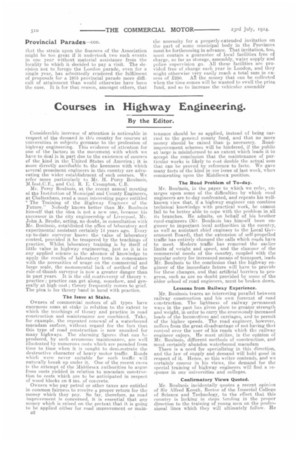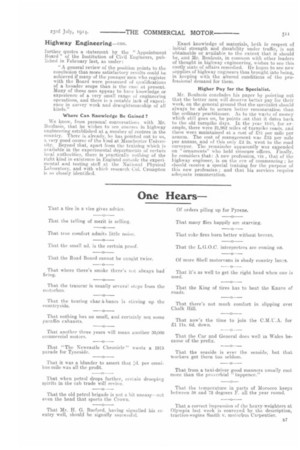Courses in Highway Engineering.
Page 2

Page 3

If you've noticed an error in this article please click here to report it so we can fix it.
By the Editor.
Considerable increase of attention is noticeable in respect of the demand in this country for courses at universities in subjects germane to the profession of highway engineering. This evidence of attention for one of the factors in the movement with which we have to deal is in part due to the existence of courses of the kind in the United States of America; it is more directly ascribable to the keenness with which several prominent engineers in this country are advocating the wider establishment of such courses. We refer more particularly to Mr. H. Percy Boulnois, M.Inst.C.E., and Col. R. E. Crompton, C.B. Mr. Percy Boulnois, at the recent annual meeting of the Institution of Municipal and County Engineers, at Cheltenham, read a most interesting paper entitled 1' The Training of the Highway Engineer of the Future." Nobody knows better than Mr. Boulnois himself that the idea is not a new one, because Ms successor in the city engineership of Liverpool, Mr. John A. Brodie, acting, no doubt, in consultation with Mr. Boulnois, established the office of laboratory and experimental assistant certainly 14 years ago. Every up-to-date surveyor knows the value of laboratory control, provided it be tempered by the teachings of practice. Whilst laboratory training is by itself of little value in highway engineering, just as it is in any applied science ili the absence of knowledge to apply the results of laboratory tests in consonance with the necessities of usage on the commercial and large scale, the monumental lack of method of the rule-of-thumb surveyor is now a greater danger than in past years. It is the old controversy of theory v. practice ; practice can get along, somehow, and generally at high cost.; theory frequently conies to grief. The plea is for theory hand in hand with practice.
The Issv.e at Stake.
Owners of commercial motors of all types have enormous sums at stake in relation to the extent to which the teachings of theory and practice in road construction and maintenance are combined. Take, for example. the repeated renewal of a waterbeund macadam surface, without regard for the fact that this type of road construction is now unsuited for many highways. The alarming figures that can he produced, by such erroneous maintenance, are well illustrated by numerous costs which are paraded from time to time when it is sought to demonstrate the destructive character of heavy motor traffic. Roads which were never suitable for such traffic will naturally break up under it. One of the recent cases is the attempt of the Middlesex authorities to argue from costs yielded in relation to macadam conatruction to costs which are to be anticipated in respect. of wood blocks on 6 ins, of coecrete.
Owners who pay petrol or other taxes are entitled in common fairness to receive ii. proper return for the money which they pay. So far, therefore, as road improvement is concerned, it is essential that any money which is raised on the pretext that it is going to be applied either for road improvement or main tenance should be so applied, instead of being carried to the general county fund, and that no more money should be raised than is. necessary. Roadimprovement schemes will be hindered,. if the public at large is misinformed to an extent which leads it to accept the conclusion that the maintenance of particular works is likely to cost double the actual sum that can be proved by reference to facts. We gave many facts of the kind in our issue of last week, when commenting upon the Middlesex position.
The Road Problem of To-day.
Mr. Boulnois, in the paper to which we refer, enfarces upon some of the difficulties by which road engineers are to-day confronted, and repeats his wellknown view that, if a highway engineer can combine technical knowledge with practical work, he cannot fail to be better able to cope with the problem in all its branches. He admits, on behalf of his brother road-engineers (Mr. Boulnois has himself been engineer to irnpoetant local authorities in the country, as well as assistant chief engineer to the Local Government Board)' that the extension of self-propelled traffic has entirely changed the calls which roads have to meet. Modern traffic has removed the earlier limits of weight and speed, and the clamour of the commercial needs of the country, coupled with the popular outcry for increased means of transport, leads Mr. Boulnois to the conclusion that the highway engineer of the immediate future will have to provide far these changes, and that artificial barriers to progress, such as are no doubt provided by some of the older school of road engineers, must be broken down.
Lessons from Railway Experience.
Mr. Boulnois traces an interesting parallel between railway construction and his own forecast of road construction. The lightness of railway permanent ways in the past has given place to greater strength and weight, in order to carry the enormously-increased loads of the locomotives and carriages, and to permit of the higher speeds. The road engineer, however, suffers from the great disadvantage of not having that control over the user of his roads which the railway engineer enjoys. He must utilize, in the opinion of Mr. Boulnois, different methods of construction, and must certainly abandon waterbound macadam
There is a need for specializing in this direction, and the law of supply and demand will hold good in respect of it. Hence, so this writer contends, and we certainly concur in his views, the demand for the special training. of highway engineers will find a rc. sponse in our universities and colleges.
Confirmatory Views Quoted.
Mr. l3ouInois, incidentally quotes a recent opinion of Sir Alfred Keogh, Rector of the Imperial College of Science and Technology, to the effect that this country is lacking in steps tending in the proper direction to the training of young men or. the professional lines which they will ultimately follow. He further quotes a statement by the "Appointment Board" of the Institution of Civil Engineers, publiehed in February last, as under: "A general review of the position points to the conclusion that mare satisfactory results could be achieved if many of the younger men who register with the Board were possessed of qualifications of a broader scope than is the ease at present. Many of these men appear to have knowledge or experience of a very small range of engineering opevations, and there is a notable lack of experience in survey work and draughtsmanship of all kinds."
Where Can Knowledge Be Gained ?
We know, from personal conversations with Mr. Boulnois, that he wishes to see courses in highway engineering established at a number of centres in the country. There is already, he has pointed out to us, a very good course of the Idnd at Manchester University. Beyond that, apart from the training which is available in the experimental departments of certain local authorities, there is practically nothiug of the right kind in existence in England outside the experimental and testing staff at the National Physical Laboratory, and with which research Col. Crompton is so closely identified. Exact knowledge of materials, both in respect of initial strength and durability under traffic, is not obtainable or available to the extent that it should be, and Mr. Boulnois, in common with other leaders of thought in highway engineering, wishes to see this costly state of affairs remedied. He hopes to see new supplies of highway engineers thus brought into being, in keeping with the altered conditions of the professional demand for them.
Higher Pay for the Specialist.
Mr. Boulnois concludes his paper by pointing out that the better men will deserve better pay for their work, on the general ground that the specialist should always be able to secure better remuneration than the ordinary practitioner. As to the waste of money which still goes on, he points out that it dates back to the old turnpike days. In the year 1840, for example, there were 21,962 miles of turnpike roads, and these were maintained at a cost of .E.S1 per mile per annum. The cost of management was ..e.15 per mile per annum, and of this only .,t2 2s. went to the road surveyor. The remainder apparently was expended on "ornaments" who held sinecure offices. Finally, he considers that: A new profession, viz., that of the highway engineer, is on the eve of commencing ; he should receive a special training for the purpose of this new professian ; and that his services require adequate remuneration.


























